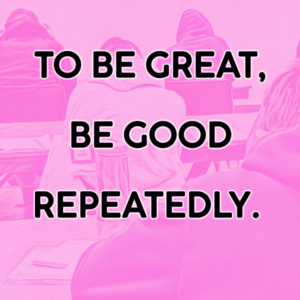 All professional tutors want to be great educators.
All professional tutors want to be great educators.
All psychologically healthy parents desire greatness for their children.
Every student wants to be great, even if their aspirations don’t include the subjects you cover with them 😉
Greatness, like happiness, is an ongoing process, not a final destination. In fact, you can’t just be great. You can accomplish great tasks, achieve great outcomes, and produce great work, but you’ll still just be you, warts and all.
How then, should we as both teachers and learners approach attempts at greatness? Commit to the long haul. I find inspiration in prolific content creator Steph Smith’s abundant thoughts on the subject:
Over the years, we’ve all encountered our fair share of successes and failures. As I’ve acquired more of both under my name, I’ve started to contemplate which experiences were truly “great” and why.
Interestingly enough, I realized that it was not the sporadic highs that were exceptional, but instead the long hauls; the sequences of events that seemed minimal at each juncture, but compounded into major gains. This led me to think further about what greatness truly means. I’ve come to learn that it’s not about overnight successes or flashes of excellence, but periods of repeatable habits.
Perhaps ‘great’ is just ‘good,’ but repeatable.
If you’re an educator, you can see how this dynamic plays out for both teachers and students:
- In the context of testing, greatness does not come from a single excellent practice test score, but rather from consistent improvement to peak performance on test day.
- In the context of test prep, greatness does not come from one student who earns a perfect score, but rather waves of students earning their best scores year after year.
How can we implement the insight that greatness depends on consistency over time? As far as our students are concerned, we need to continue to promote steady deliberate practice day by day instead of every once in a while when their schedules open up. More regular instructional sessions, productive homework assignments, and quality practice testing all lead to better learning outcomes. This is math anybody can understand.
Educators need to embrace that concept of consistency as well. Too many “tutors” treat their work in this space as a side hustle, one that they might as easily replace with serving lattes or driving an Uber if those gigs paid more. You can be decent, maybe even good, as a dabbler or dilettante. Great tutors, on the other hand, tutor all the time, learn more about tutoring all the time, and talk with other tutors all the time. You don’t need to deliver your best work every day, but you do need to show up and do well.
To be great, be good, repeatedly.
— Mike Bergin
Tutor Tips, Tools, and Thoughts
Artificial intelligence is not the end of high-school English
Knowledge is required to communicate knowledge.
The SAT is an indicator of college readiness — let’s not throw it away
Tests like the SAT and ACT tell us too much of value to discard wantonly.
Society gives students an A for effort
We want people to be successful and to work hard, but too often we’re pursuing the wrong goal.
How to Write Essays That Spread
Implement angles, deadlines, and the concept of thrust and drag to write better more often.
Stop Teaching Kids to Say ‘Sir’ and ‘Ma’am’
Is it about respect or obedience?
Did you enjoy this issue of Tutor: The Newsletter? Get the next issue right in your inbox by subscribing below:
